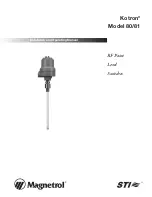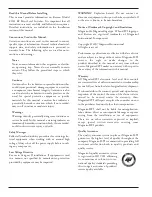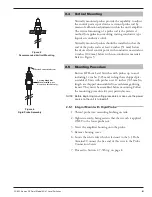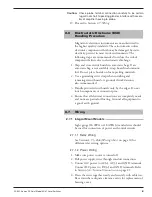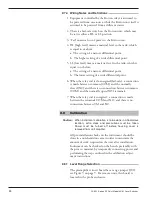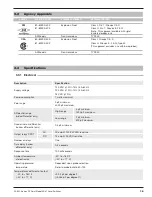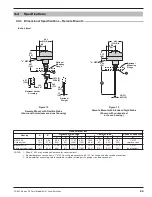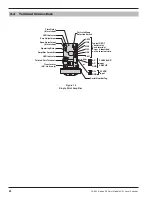
7
50-605 Kotron RF Point Model 80/81 Level Switches
2.5.4.2 Preamplifier
Caution:
Flexible probes are shipped with the cable clamp and the
probe nut hand tightened. The end of a flexible probe
MUST be secured to the bottom of the tank by either
attachment to a bracket or to a heavy weight in order to
keep the probe taut.
1. Unscrew probe from probe housing. Remove Mylar hous-
ing insulator located over the clamp. Refer to Figure 7 on
page 5.
Caution:
Do not discard Mylar housing insulator.
2. Attach weight (if used) to probe end.
3. Insert probe end through tank mounting bushing and
feed cable into the tank. Do not allow probe insulation to
be damaged by scraping against the bushing threads.
Caution:
Probe cable must not be in contact with anything metal-
lic in its final installation position.
4. Secure lower end of probe (or optional weight) to tank
bracket if one is used.
5. Apply thread sealant to mounting nut.
6. Screw mounting nut into tank bushing until tight.
Caution:
Apply wrench to lower probe nut only.
NOTE: Do not allow the probe to fall in the tank while following steps
7 through 11.
7. Loosen both socket clamp screws.
8. Pull clamp and Teflon retaining bushing off probe.
9. While holding probe cable, loosen upper probe nut.
10. Pull excess cable up through probe nuts until cable is taut.
11. Tighten the probe nuts.
12. Cut off cable 1.35 inches (34 mm) above top of upper
probe nut and strip off 1.25 inches (32 mm) of insulation.
13. Slide Teflon retaining bushing onto cable and seat it into
the upper probe nut.
14. Slide clamp onto cable and seat it in the Teflon retaining
bushing.
15. Tighten both socket head clamp screws to approximately
35 in./lbs. torque.
16. Slip Mylar housing insulator over clamp.
17. Screw housing onto probe and tighten. Make sure conduit
connection is properly aligned for wire entry.
18. Locate the white wire which is fastened to the (+) Probe
Terminal on the circuit board. Connect the free end of
this wire to the Probe Connection Screw. Refer to
Figure 7 on page 5.

